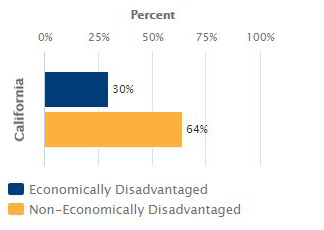Higher-Income Students 2x More Likely to Meet Standards for CA’s New Common Core Tests
Higher income California students are more than twice as likely to meet or exceed grade-level standards on California’s new standardized tests compared to their lower-income counterparts, according to the first year of published test results, which are now available to compare and visualize, by county and by district, on Kidsdata.
For the English Language Arts/Literacy (ELA) test, 64 percent of non-economically disadvantaged students met or exceeded test standards, versus 30 percent of economically disadvantaged students. For the mathematics test, 52 percent of non-economically disadvantaged students met or exceeded test standards, versus 21 percent of economically disadvantaged students. Economic disadvantage is determined by whether or not a student is eligible for the state's free or reduced price lunch program or if neither of the student's parents graduated from high school.
When broken down by county, the wealthier Bay Area counties tended to show the highest rates of students passing these exams, while inland, central valley and more rural counties had the lowest rates.
The Smarter Balanced ELA and math tests, which are both administered online, replaced the paper-based Standardized Testing and Reporting (STAR) program, which had been the statewide testing system since 1998. Students in grades 3-8 and high school juniors take the Smarter Balanced tests, which assess the Common Core principles of critical thinking and writing as well as real-world application.
Each state is required to test at least 95 percent of its students, both state-wide and district-wide, in order to receive federal funding. In 2015, 97 percent of California students took the Smarter Balanced tests, but 21 school districts failed to meet the threshold due to parental exemptions. In the Palo Alto Unified School District, for example, 50 percent of juniors at both of the city’s high schools opted out of the 2015 tests due to their proximity to the Advanced Placement and SAT exams.
Early intervention is critical for children who are struggling with reading and math. Limited skills in these subjects can have effects into adulthood, too, as proficiency in both reading and math is associated with better employment and income prospects.
According to experts, policy options that could improve reading and math proficiency include: ensuring that all children have access to high-quality preschool or kindergarten readiness programs, supporting strategies to involve families in school, evaluating the state’s new accountability system for effectiveness, and providing equitable student access to Common Core-aligned curricula as well as the technology needed for Smarter Balanced testing.
Related Data:
Helpful Links
Achievement Gap Points to Ineffectiveness of Decades of Reforms, EdSource
Health and Academic Achievement, Centers for Disease Control and Prevention
Student Achievement in California: 2015 California Assessment of Student Performance and Progress (CAASPP) Results, Education Trust–West
The Local Control Funding Formula: An Essential EdSource Guide (PDF), EdSource
The Power of Parents: Research Underscores the Impact of Parent Involvement in Schools, EdSource and New America Media
The Whole School, Whole Community, Whole Child Model, Journal of School Health
Time for Equity: Expanding Access to Learning, Voices in Urban Education
Kidsdata Tip
Ever wondered where Kidsdata gets its data? Check out a list of Kidsdata’s 35 trusted public sources.
|
Students Meeting or Exceeding Grade-Level Standard in English Language Arts (CAASPP), by Socioeconomic Status
Year: 2015

|

